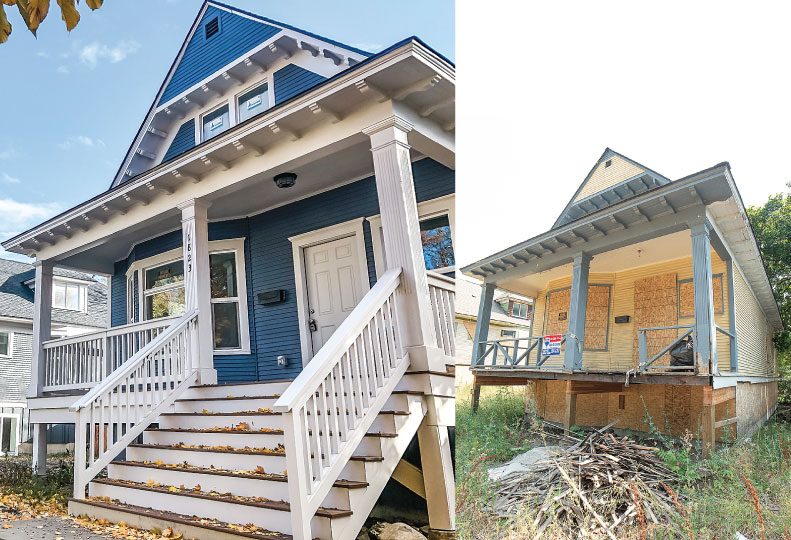
Home » 'Zombie' sites transformed into affordable homes
'Zombie' sites transformed into affordable homes
Two new Habitat families celebrate homeownership

November 18, 2021
Habitat for Humanity-Spokane celebrated with two families as they received the keys to their newly rehabilitated homes on Sharp Avenue in the West Central neighborhood earlier this month, and the organization is planning two more such celebrations in Spokane in coming weeks.
Habitat for Humanity acquired the “zombie” homes on Sharp through the city of Spokane’s receivership process. The units have been a part of the Derelict Housing Acquisition and Homeownership program, a partnership between the city of Spokane and Habitat for Humanity to revitalize neighborhoods and increase homeownership opportunities for those experiencing low incomes.
With Community Development Block Grant funding, Habitat and its partners have focused on acquiring units in neighborhoods at the highest risk for displacement, gentrification, and lack of affordable homeownership opportunities, says Michelle Girardot, CEO of Habitat for Humanity-Spokane, in a press release regarding the Sharp Avenue projects.
By partnering with the city to identify possible acquisitions, Habitat can leverage its volunteer base, sponsors, and homebuyer readiness activities to breathe new life into these homes while creating access to homeownership. Those leveraged activities also ensure the homes are affordable at purchase and remain affordable for generations, Girardot explains.
“Programs like CDBG are crucial to creating a sustainable future for Spokane by building more affordable homeownership opportunities. Every revitalized ‘zombie’ home, completed with robust partnerships, promises to be an affordable homeownership option now and forever,” Girardot says in a press release regarding the Sharp Avenue projects. “Shared equity homeownership programs and the revitalization of abandoned properties like these have a direct correlation on positive job creation while creating thriving mixed-income neighborhoods.”
Citing Federal Reserve data, she says that a single abandoned property in Spokane diminishes over $60,000 in value from nearby properties.
The financial burden doesn’t end there: Derelict units in Spokane represent municipal expenditures in excess of $2 million every year as the responsibility of cleaning, marketing, or even demolishing these properties falls onto the city and taxpayers, further depressing these areas and Spokane as a whole, Girardot contends.
The partnership requirements for qualified homebuyer families earning 80% below the area median income are rigorous but ensure each homebuyer is more than prepared to be a successful homeowner, she says.
Habitat homeowners receive financial education, help build their houses, and pay an affordable mortgage.
Families that partner with Habitat must demonstrate their desire to build better lives for themselves and their children. Partner families spend 250 hours helping build their own homes and take Habitat-sponsored financial education classes in which they learn how to improve their credit, pay off debt, and save money. When they have completed all the program requirements, they purchase their Habitat home at an affordable price with mortgage payments set at no more than 30% of their incomes.
Driven by the vision that everyone needs a decent place to live, Habitat for Humanity-Spokane began in 1987.
Habitat’s next home dedications in the West Central neighborhood are set for Nov. 30 at the 2200 block of West Mallon Avenue, and Dec. 10 on the 700 block of North Lindeke Street.
Like this story?
You’ll love the rest. Subscribe today, and you’ll receive a year’s subscription to the Journal of Business, unlimited access to this website, daily business news emails, and weekly industry-specific
e-newsletters. Click here for 50% off your first year.
Latest News Special Report Real Estate & Construction Government
Related Articles
Related Products

![Brad head shot[1] web](https://www.spokanejournal.com/ext/resources/2025/03/10/thumb/Brad-Head-Shot[1]_web.jpg?1741642753)

